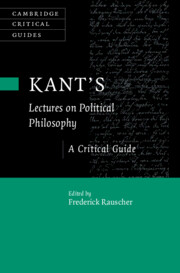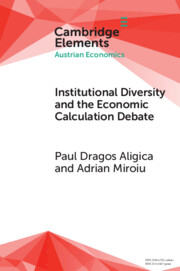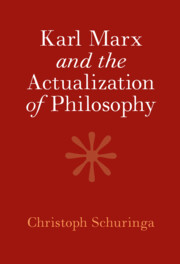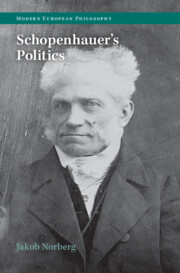Refine search
Actions for selected content:
86 results
Chapter 7 - Public Policy and Cooperation
-
- Book:
- Kant and Environmental Philosophy
- Published online:
- 01 November 2025
- Print publication:
- 20 November 2025, pp 185-219
-
- Chapter
- Export citation
Introduction: Human Rights and Distributive Justice
-
- Book:
- In Defense of Economic and Social Human Rights
- Published online:
- 06 November 2025
- Print publication:
- 20 November 2025, pp 1-30
-
- Chapter
- Export citation
Detained Migrant Children, Autonomy, and Positive Duties
-
- Journal:
- Ethics & International Affairs , First View
- Published online by Cambridge University Press:
- 08 October 2025, pp. 1-26
-
- Article
-
- You have access
- Open access
- HTML
- Export citation
Chapter 11 - The Natural Preconditions of Political Freedom
- from Part V - Reconciling between Freedom, External Authority, and Nature
-
-
- Book:
- Platonic Autonomy
- Published online:
- 07 August 2025
- Print publication:
- 31 July 2025, pp 235-255
-
- Chapter
- Export citation

Kant's Lectures on Political Philosophy
- A Critical Guide
-
- Published online:
- 18 July 2025
- Print publication:
- 07 August 2025

Institutional Diversity and The Economic Calculation Debate
- The Feasibility Issue Revisited
-
- Published online:
- 04 July 2025
- Print publication:
- 24 July 2025
-
- Element
- Export citation
The value of dignity appeals: evidence from a social media experiment
-
- Journal:
- Political Science Research and Methods , First View
- Published online by Cambridge University Press:
- 24 June 2025, pp. 1-6
-
- Article
-
- You have access
- Open access
- HTML
- Export citation
Introduction
-
- Book:
- Karl Marx and the Actualization of Philosophy
- Published online:
- 17 April 2025
- Print publication:
- 24 April 2025, pp 1-17
-
- Chapter
- Export citation
Chapter 2 - Marx’s Critique of Hegel: Politics
-
- Book:
- Karl Marx and the Actualization of Philosophy
- Published online:
- 17 April 2025
- Print publication:
- 24 April 2025, pp 39-61
-
- Chapter
- Export citation

Karl Marx and the Actualization of Philosophy
-
- Published online:
- 17 April 2025
- Print publication:
- 24 April 2025
4 - Fairness and Artificial Intelligence
- from Part I - AI, Ethics and Philosophy
-
-
- Book:
- The Cambridge Handbook of the Law, Ethics and Policy of Artificial Intelligence
- Published online:
- 06 February 2025
- Print publication:
- 13 February 2025, pp 79-100
-
- Chapter
-
- You have access
- Open access
- HTML
- Export citation
Introduction
-
- Book:
- Schopenhauer's Politics
- Published online:
- 09 January 2025
- Print publication:
- 23 January 2025, pp 1-22
-
- Chapter
-
- You have access
- Open access
- HTML
- Export citation

Schopenhauer's Politics
-
- Published online:
- 09 January 2025
- Print publication:
- 23 January 2025
-
- Book
-
- You have access
- Open access
- Export citation
Does Democracy Exist?
-
- Article
-
- You have access
- Open access
- HTML
- Export citation
The Corruption of “Corruption”
- Part of
-
- Journal:
- Public Humanities / Volume 1 / 2025
- Published online by Cambridge University Press:
- 19 December 2024, e33
-
- Article
-
- You have access
- Open access
- HTML
- Export citation
Public Health as If People Mattered
-
- Journal:
- Social Philosophy and Policy / Volume 41 / Issue 2 / Winter 2024
- Published online by Cambridge University Press:
- 06 February 2025, pp. 480-504
- Print publication:
- Winter 2024
-
- Article
- Export citation
ZENO OF SIDON AND THE STATUS OF WOMEN IN EPICUREANISM
-
- Journal:
- The Classical Quarterly / Volume 74 / Issue 2 / December 2024
- Published online by Cambridge University Press:
- 16 May 2025, pp. 575-582
- Print publication:
- December 2024
-
- Article
-
- You have access
- Open access
- HTML
- Export citation
The Power and Limits of Political Philosophy in Analyzing Healthcare Markets
-
- Journal:
- Journal of Law, Medicine & Ethics / Volume 52 / Issue 4 / Winter 2024
- Published online by Cambridge University Press:
- 31 January 2025, pp. 903-906
- Print publication:
- Winter 2024
-
- Article
- Export citation
Going beyond the wordlessness of EU law
-
- Journal:
- European Law Open / Volume 3 / Issue 2 / June 2024
- Published online by Cambridge University Press:
- 25 November 2024, pp. 372-388
-
- Article
-
- You have access
- Open access
- HTML
- Export citation
A Millian Case against Epistemic Arguments for Federalism
-
- Article
-
- You have access
- Open access
- HTML
- Export citation
